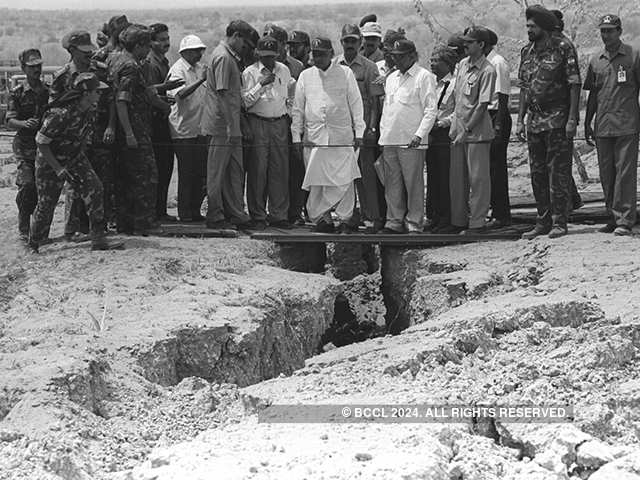On May 11 and 13, 1998, India conducted five nuclear tests, which resulted in significant changes in the country’s self-esteem and international standing. Since its first test in 1974, the country’s military nuclear policy has been mired in ambiguity and opacity. With the 1998 tests, however, India became a nuclear weapons state, which elicited conflicting reactions from the international community, leading in sanctions and isolation. Nonetheless, the tests were a watershed moment in India’s self-assurance and realisation of its potential.

Nuclear tests conducted by India
- Smiling Buddha (Pokhran-I): On May 18, 1974, India conducted its first nuclear test in Pokhran, Rajasthan. The “smiling Buddha” test was a “peaceful nuclear explosion.”
- Pokhran-II: On May 11 and 13, 1998, India conducted its second series of nuclear tests in Pokhran, Rajasthan. Three underground nuclear tests were conducted on May 11 and two on May 13. These tests, codenamed Operation Shakti, were carried out under the leadership of Prime Minister Atal Bihari Vajpayee.
Nuclear tests debunked falsehoods that had previously dominated international perception
- Isolation of India: The idea that India would be alone and its economy would collapse as a result of sanctions and worldwide opprobrium was debunked. Instead, the US was the first to mainstream India, seeing it as a unique situation, culminating in the 2005 India-US Civil Nuclear Agreement.
- The Inability of India to Manage Nuclear Weapons: The ethnocentric idea fostered by Western non-proliferation absolutists that India and South Asia could not be trusted with nuclear weapons was also debunked.
Nuclear experiments have the following advantages: From the perspective of India
- Deterrence: The nuclear tests equipped India with a credible nuclear deterrence capability, which may dissuade other nuclear-armed enemies from using nuclear weapons against India.
- National pride and self-assurance: For many Indians, the successful nuclear tests were viewed as a tremendous accomplishment and source of national pride. They boosted India’s self-esteem and reinforced its place as a significant world power.
- India’s successful nuclear tests earned it international prestige and cemented its status as a nuclear-armed state. This acknowledgement was crucial for India’s security and diplomatic objectives.
- Negotiating power: With its new nuclear status, India now has more bargaining power in international forums and bilateral partnerships with other countries.
- Advanced scientific and technological capabilities were required for the development and testing of nuclear weapons, and the successful tests highlighted India’s progress in these areas.
International ramifications: a series of events
- Under the Glenn Amendment, the United States levied penalties on India.
- In response, Pakistan conducted a series of nuclear tests.
- Many other countries, especially China, condemned India for what they perceived as an unacceptable disregard for the world community’s common will.
@the end
The nuclear tests conducted by India on May 11 and 13, 1998, were a watershed point in the country’s history, enhancing its self-confidence and altering its international standing. Despite international condemnation and sanctions, India’s nuclear programme has contributed to the development of a credible nuclear deterrent, making it an important player in the world system.
Source: https://economictimes.indiatimes.com/news/defence/india-marks-25th-anniversary-of-1998-pokhran-nuclear-tests/articleshow/100165477.cms#:~:text=May%2011%20is%20celebrated%20as,successful%20conduct%20of%20Pokhran%20tests.
